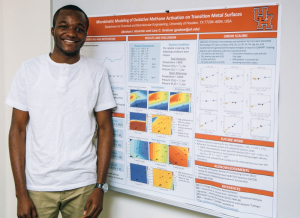Chemical engineering undergraduate student and PURS scholar Abraham Aboiralor won the best undergraduate poster award in the COMP (Computers in Chemistry) division at the American Chemical Society (ACS) meeting in Dallas last March. The award consists of a certificate and a $100 cash prize.
“I was surprised because this was my first ACS conference and it’s a really big deal for even graduate researchers to win a poster award at the conference, so I was really surprised and happy at the same time,” Aboiralor explained.
The ACS is the largest scientific society and organizes two annual meetings for chemists and other closely related disciplines. Over 13,000 researchers were in attendance at the 2014 spring meeting. Aboiralor competed against hundreds of other undergraduate student posters to secure his win for the best overall poster.
Aboiralor’s award-winning poster is based off of research he is conducting under the mentorship and guidance of Lars Grabow, assistant professor of chemical and biomolecular engineering. Grabow and his research team are currently working to identify catalysts which can turn methane – a cheap and plentiful chemical – into something rarer and more valuable, such as methanol, ethane or ethylene, all of which have dozens of uses, mostly involving the creation of plastics and polymers. (WATCH THE VIDEO of Abraham Aboiralor and Dr. Lars Grabow discussing this research)
But this is much easier said than done. In order to change methane gas into a more useful chemical, one must first break the very strong and stable carbon-hydrogen bonds that methane is famous for. Methane molecules are perfectly symmetrical, consisting of one carbon atom surrounded by four hydrogen atoms. This symmetry means there’s no obvious or simple way to split a single hydrogen atom from methane – the first step in converting the gas into a new chemical.
In fact, this split can only take place at very high temperatures – so high that the remaining atoms simply burn off, essentially wasting the methane gas entirely.
The key to solving this problem, Grabow believes, is finding the catalyst that is the most effective at separating hydrogen atoms from methane molecules in the presence of an oxygen-containing molecule, such as molecular oxygen (O2), water (H2O), or carbon dioxide (CO2).
This is where Aboiralor steps into the research equation. With his poster titled "Microkinetic Modeling of Oxidative Methane Activation on Transition Metal Surfaces," Aboiralor offers a model that can be used to screen catalysts that can make this reaction happen at lower temperatures, which is needed for selective methane conversion and is very attractive to industry.
But conducting this cutting-edge research was only half the battle for winning the best undergraduate research poster award at the ACS conference. Contestants also had to explain their research and findings to ACS judges in a two-minute presentation.
“There were students from schools like MIT, extremely high-quality students, all around me. And I knew with those students around me that my two-minute presentation had to be great, and I had to know what I was talking about, so I just didn’t let myself get intimidated and focused on my work. For the most part, I wasn’t focused on winning the award, I just wanted to give a great poster presentation and talk to other researchers who were interested in this work.”
And that’s precisely what Aboiralor did. He says attending the ACS Conference and competing in the poster competition allowed him to meet researchers from across the country and the world who are also interested in similar research.
“There were people from all over the world – Europe, Singapore, India, Holland. During the undergraduate poster session we had the opportunity to go around and look at our colleagues’ work and talk to them about it. So I met people from all over the world working on many different aspects of this research.”
This was particularly important to Aboiralor, who is interested in methane conversion for another important (and more personal) reason. Gas flare, or the process of burning off unusable gas, is extremely common in Aboiralor’s home country of Nigeria due to the lack of pipelines and other gas transportation infrastructure. However, gas flaring is a huge contributor to worldwide carbon dioxide emissions, and improperly operated flares can emit methane and other volatile compounds that can exacerbate asthma and other respiratory breathing problems.
One important element of Grabow’s research teams’ work is to turn methane into a chemical that’s safer for emissions, such as that from a car or a chemical plant, so there’s less need for gas flaring and therefore less damage to the environment.
“Dr. Grabow’s work really interested me because it tackles the problem of gas flaring, which is a big problem for my country of Nigeria, where we have a lot of natural gas but must use flaring because we don’t know what to do with it.” Aboiralor says that he hopes his contributions to Grabow’s research, and Grabow’s contributions to the research community at large, will open the door for more collaborations and research projects which will eventually provide a solution for ending the gas flaring problem.
“I came to UH because Houston is the energy capital of the world, and from where I’m from we have a lot of natural gas and oil. I thought by coming to Houston I could learn more on how to maximize oil and gas utilization so when I go back to my country I can give back,” Aboiralor explained. “Hopefully, thanks to Dr. Grabow’s research, there will be no more gas flare in my country and they will be able to use natural gas to make higher value chemicals.”
Aboiralor plans to continue this research with Grabow’s team long into his graduate school career, until he can someday “change the world,” he explained. And Grabow couldn’t be happier to keep Aboiralor on his team. “I’m very proud of him. Abraham has achieved a lot in his young research career,” Grabow said. “He has a very bright future ahead of him.”
